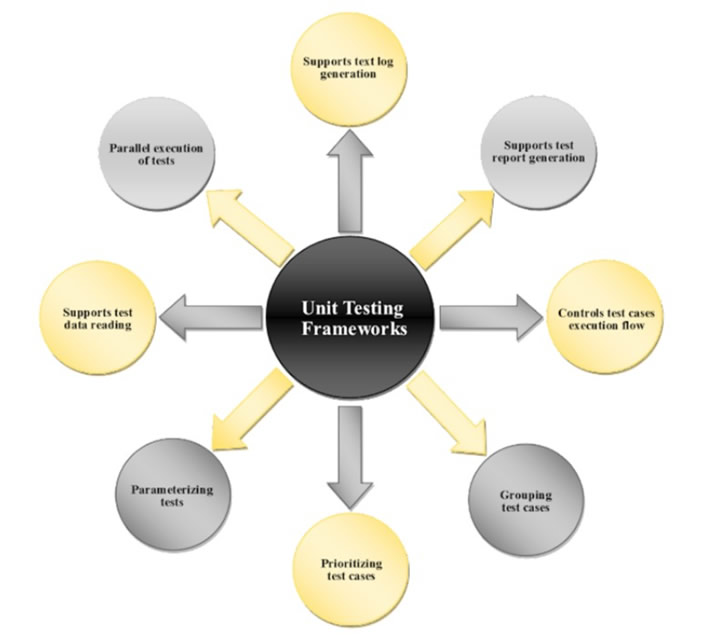Unit testing ensures that every feature or component of a program functions as intended. Unit testing is carried out by developers during the development sprint stages. This assists them in identifying and correcting tiny faults that might lead to larger issues in later stages. Previously, conducting unit tests on a built module was a time-consuming and laborious effort since developers had to manually test code for each component. As a result, final release dates were pushed back.
Related Blog Post > Unit Testing Techniques and Best Practices
Unit testing, on the other hand, has become faster and more efficient as automation technologies like as Selenium have grown in popularity. As a result of web application developers using a variety of programming languages, they must choose a unit testing framework that is compatible with their preferred programming language since Selenium supports a huge list of Unit Testing Frameworks, based on the programming languages. i.e. Different programming languages will be compatible with different Unit Testing Frameworks.

Example: TestNGunit testing framework is compatible with Java programming language and NUnit unit testing framework is compatible with C# programming language.
Purpose of Unit Testing Frameworks in Selenium:
Before understanding how Unit Testing Frameworks are used in Selenium, we have to understand that Unit testing is generally done by developers. i.e. Developer break the complete application code into smaller units and test all the units separately. This process of breaking the code into smaller units and testing is known as Unit Testing. Unit Testing can be performed in both manual and by automation.

In order to automate this unit testing process, developers use different Unit Testing Frameworks based on the programming languages they have used. i.e. While the developer continue developing the application code by simultaneously creating unit test for the developed code, the existing unit tests will be automatically run by the Unit Testing Framework on the earlier developed code, to check the newly developed code is not breaking the earlier devel

Unit Testing Frameworks can be used in Selenium to automate/support/perform any of the below:
- Controls the flow of test case execution.
- Grouping the test cases in to separate groups is possible.
- Prioritizing the test cases is possible to prioritize which test needs to be executed first and which next.
- Parameterizing the tests in such a way that the same tests can run multiple times using different sets of data.
- Supports reading the data from external sources like Excel files etc.
- Parallel execution of tests to save time of test execution by executing multiple tests at the same time.
- Supports generating text logs to later find-out what are the different things that happened while the tests were executing.
- Supports generating reports to find out the test results after tests execution.
The below diagram depicts the purpose of Unit Testing Frameworks in Selenium:

Image: selenium-by-arun.blogspot.com
Unit Testing Frameworks that are supported by Selenium:
As we have understood the purpose of using Unit Testing Frameworks in Selenium Automation, now lets find out the different unit testing frameworks that are supported by Selenium based on different programming languages.
Programming languages and their compatible Unit Testing Frameworks:
The below are the different Unit Testing frameworks that are supported by Selenium and categorized according to their compatible Programming languages.
- Java : TestNG and JUnit Unit Testing Frameworks
- C# : NUnit and Haskell Unit Testing Frameworks
- PHP: (Behat+Mink) Unit Testing Frameworks
- Python: unittest , pyunit , py.test and robot framework Unit Testing Frameworks
- Ruby: RSpec and Test::Unit Unit Testing Frameworks
The below diagram depicts the above categorization of Unit Testing frameworks according to different programming languages:

Image: selenium-by-arun.blogspot.com
Java Frameworks for Unit Testing with Selenium
Java is commonly utilized in the development of web applications. Developers frequently utilize two frameworks for doing unit tests on Java-based applications: JUnit and NUnit.
JUnit
JUnit is the most popular tool for automating unit tests in Java-based applications. It was created solely for the purpose of developing and running repeatable tests. The JUnit testing framework facilitates test-driven development. JUnit, like anything else, has grown over time and can be readily integrated with Selenium.
The TestQuality Command Line Interface allows you to upload your automated test results from Selenium to TestQuality.
Automated test results must be output in JUnit XML format, which most test automation tools will provide. Test result attachments and related defects are also supported through test name tags or console outputs. Join now and Try TestQuality for Free!
Download TestQuality Command Line Interface
- Download CLI tools from http://cli.testquality.com/
- CLI tools are available for Windows, MacOS, Linux, and Alpine.
Requirements
In order to upload XML you will need to:
- Create a target Test Plan
- Authenticate with TestQuality
- Run the command to upload files
The main advantages of JUnit Testing Framework
- It is simple to develop automated, self-verifying tests.
- Support for test assertions is provided.
- Aids in Test-Driven Development.
- Almost all IDEs support it.
- It is compatible with build tools such as Maven and Ant.
TestNG
TestNG (NG = Next Generation)is inspired by NUnit and JUnit and has extra functions to overcome JUnit's restrictions. This implies that TestNG is intended to handle all testing categories, including unit, integration, functional, and end-to-end testing.
Developers and QAs may use the TestNG Framework to design more flexible test cases that take use of features such as grouping, sequencing, and parameterizing. In addition, suitable test reports may be generated to assess failed and successful tests.
The main advantages of TestNG Unit Testing Framework
- Allows the execution of Data-Driven Tests in TestNG using the @DataProvider annotation.
- Allows developers or QAs to prioritize test methods.
- Unidentified exceptions are handled automatically, and these exceptions are noted in the report as failed steps.
- Provides detailed test reports to testers.
- Allows for the grouping of test cases for easier test suite administration.
- Annotations that are simple to understand are provided.
Python Frameworks for Selenium Unit Testing
PyUnit or UnitTest
PyUnit, often known as UnitTest, is a unit testing automation framework included with Python. JUnit was the inspiration for this framework. The basic class TestCase in PyUnit contains all assertion methods as well as cleanup and setup operations. It may also generate XML reports similar to those generated by JUnit by utilizing the UnitTest-xml-reporting test runner. For grouping and loading tests, QAs may also utilize the load methods and TestSuite class.
The main advantages of PyUnit or UnitTest Unit Testing Framework
- UnitTest is simple to use, especially for non-Python people.
- The execution of test cases is simple.
- Because the UnitTest framework is included with the Python library, no further configuration or installation is necessary.
- Instantly generates reports for test analysis.
PyTest
PyTest is yet another well-known open-source test automation platform for Python-based applications. Although PyTest may be used for any sort of testing, it is most commonly used for API and complicated functional testing. With its simple syntax, PyTest makes it simple to test databases, user interfaces, and APIs. It also has the ability to execute parallel tests. Popular companies like as Dropbox and Mozilla have switched from UnitTest to PyTest due to capabilities such as assert rewriting and the ability to interface with third-party plugins.
The main advantages of PyTest Unit Testing Framework
- Allows developers to write shorter test cases.
- Allows developers to execute a single test or a subset of tests.
- It is open-source and may be integrated with a diverse variety of third-party plugins.
- Allows for the execution of simultaneous tests.
Ruby Frameworks for Selenium Unit Testing
Test:Unit
Test:Unit is a popular unit testing framework for Ruby applications that is based on the ideas of xUnit. The framework includes the standard Ruby library. It is simple to use in conjunction with Selenium to execute automated unit tests. However, prior understanding of Xunit frameworks and Ruby programming is required before utilizing it.
The main advantages of Test:Unit Unit Testing Framework
- Allows developers to bring together comparable TestCases or TestSuites for easier testing.
- Developers may easily troubleshoot individual test cases thanks to simple assertions.
- Provides all of the tools needed to run individual or group tests.
Javascript Frameworks for Selenium Unit Testing
JEST
JEST is unquestionably the most popular open-source Javascript testing framework, developed and maintained by Facebook. Despite the fact that JEST can handle functional, end-to-end, and integration tests, developers choose to use it mostly for unit testing. It is mostly used for testing React-based apps. JEST's ability to provide zero-configuration testing is a significant benefit. This implies that teams or individuals do not have to spend a lot of time setting the test environment.
The main advantages of Jest Unit Testing Framework
- JEST includes a snapshot testing tool as well as a built-in tool for evaluating code coverage.
- VueJS, NodeJS, Angular, and other Babel-based projects are supported.
- Firm documentation assistance using a uniform syntax
- Provides a no-configuration experience
Jasmine
Jasmine, which was introduced in 2010, is another JavaScript testing framework that developers and QAs may use for unit testing. It is influenced positively by the RSpec and JSSpec frameworks, and it enables Behavioral Driven Development (BDD). Jasmine can test all forms of JavaScript apps.
Developers and QAs may use Jasmine to automate end-user behavior with specified delay. This aids in simulating genuine user behavior. Jasmine is primarily used for frontend testing since it allows visibility and responsive testing.
The main advantages of Jasmine Unit Testing Framework
- It doesn't need the use of a Document Object Model (DOM).
- Supports both backend and frontend testing.
- The simple syntax makes coding a breeze.
- It has solid documentation and community support.
Conclusion:
Unit testing ensures that every piece of code is extensively tested as soon as it is written. Rapid unit testing minimizes the likelihood of serious defects surfacing later in the process. Given this, it is critical to be aware of the language-specific frameworks available for web test automation that are easily compatible with Selenium. These Unit Testing Frameworks play an important role in building Test Automation Frameworks in Selenium.
Selenium and Automation Testing
As explained, Selenium is an automation framework that is currently backed by top web browser developers (Google, Microsoft, Apple, Mozilla). It is safe to say Selenium is one of the best ways to automate our web browser for now.
In our Blog, we recently took a Close Look at Selenium Benefits and Disadvantages but also, we made a short list of several Selenium Testing Tools, including free and non-free ones, and then came up with the comparison of two Selenium best ones – Robot Framework and Katalon Studio. Also, we analyze different types of Selenium WebDriver Exceptions.
TestQuality ,thanks to its Command Line Interface, enables testers to upload any automated test results from Selenium to TestQuality making it simple to start and run automated tests.






